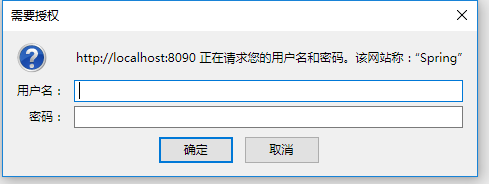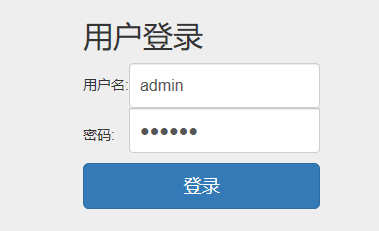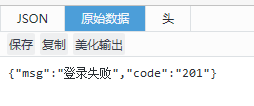Spring boot 中 Spring Security 使用改造5部曲(转)

,spring security 会默认使用一个用户名为:user 的用户,密码就是 启动的时候生成的(通过控制台console中查看),如图

然后在用户名中输入:user 密码框中输入 上面的密码 ,之后就可以正常访问之前URL了。很显然这根本不是我们想要的,接下来我们需要一步一步的改造。
改造1 使用页面表单登录
WebSecurityConfigurerAdapter ,重写configure方法。@Configuration
@EnableWebSecurity
public class SecurityConfig extends WebSecurityConfigurerAdapter {@Override</br>
</span><span style="color: #0000ff;">protected</span> <span style="color: #0000ff;">void</span> configure(HttpSecurity http) <span style="color: #0000ff;">throws</span><span style="color: #000000;"> Exception {</br>
</span><span style="color: #008000;">//</span><span style="color: #008000;"> TODO Auto-generated method stub</br>
</span><span style="color: #008000;">//</span><span style="color: #008000;">super.configure(http);</span></br>
http
.formLogin().loginPage("/login").loginProcessingUrl("/login/form").failureUrl("/login-error").permitAll() //表单登录,permitAll()表示这个不需要验证 登录页面,登录失败页面
.and()
.authorizeRequests().anyRequest().authenticated()
.and()
.csrf().disable();
}
}

<form class="form-signin" action="/login/form" method="post">
<h2 class="form-signin-heading">用户登录</h2>
<table>
<tr>
<td>用户名:</td>
<td><input type="text" name="username" class="form-control" placeholder="请输入用户名"/></td>
</tr>
<tr>
<td>密码:</td>
<td><input type="password" name="password" class="form-control" placeholder="请输入密码" /></td>
</tr>
<tr><td colspan="2"></br>
<button type="submit" <span style="color: #0000ff;">class</span>="btn btn-lg btn-primary btn-block" >登录</button></br>
</td></br>
</tr></br>
</table></br>
</form></pre>

<!DOCTYPE HTML>
<html xmlns="http://www.w3.org/1999/xhtml"
xmlns:th="http://www.thymeleaf.org">
<head>
<title>用户登录</title>
<link rel="stylesheet" href="https://cdn.bootcss.com/bootstrap/3.3.7/css/bootstrap.min.css" />
<link rel="stylesheet" href="/css/sign.css" />
</head>
<body>
<h3>用户名或密码错误</h3>
</body>
</html>


我们用一个测试的RestController来测试

@RestController
public class HelloWorldController {
@RequestMapping("/hello")
public String helloWorld()
{
return "spring security hello world";
}
}



@Autowired
public void configureGlobal(AuthenticationManagerBuilder auth) throws Exception {
auth
.inMemoryAuthentication()
.withUser("user").password("password").roles("USER");
}

我们也照样,这是把用户名改成 admin 密码改成 123456 roles是该用户的角色,我们后面再细说。

@Autowired
public void configureGlobal(AuthenticationManagerBuilder auth) throws Exception {
auth
.inMemoryAuthentication()
.withUser("admin").password("123456").roles("USER");}</span></pre>
还有种方法 就是 重写 另外一种configure(AuthenticationManagerBuilder auth) 方法,这个和上面那个方法的作用是一样的。选其一就可。

@Override
protected void configure(AuthenticationManagerBuilder auth) throws Exception {
// TODO Auto-generated method stub auth
.inMemoryAuthentication()
.withUser("admin").password("123456").roles("USER")
.and()
.withUser("test").password("test123").roles("ADMIN");
}

程序运行起来,这时用我们自己的用户名和密码 输入 admin 和123456 就可以了。

public class UserInfo implements Serializable, UserDetails {
/**
*
*/
private static final long serialVersionUID = 1L;
private String username;
private String password;
private String role;
private boolean accountNonExpired;
private boolean accountNonLocked;
private boolean credentialsNonExpired;
private boolean enabled;
public UserInfo(String username, String password, String role, boolean accountNonExpired, boolean accountNonLocked,
boolean credentialsNonExpired, boolean enabled) {
// TODO Auto-generated constructor stub
this.username = username;
this.password = password;
this.role = role;
this.accountNonExpired = accountNonExpired;
this.accountNonLocked = accountNonLocked;
this.credentialsNonExpired = credentialsNonExpired;
this.enabled = enabled;
}
// 这是权限
@Override
public Collection<? extends GrantedAuthority> getAuthorities() {
// TODO Auto-generated method stub
return AuthorityUtils.commaSeparatedStringToAuthorityList(role);
}
@Override
public String getPassword() {
// TODO Auto-generated method stub
return password;
}
@Override
public String getUsername() {
// TODO Auto-generated method stub
return username;
}
@Override
public boolean isAccountNonExpired() {
// TODO Auto-generated method stub
return accountNonExpired;
}
@Override
public boolean isAccountNonLocked() {
// TODO Auto-generated method stub
return accountNonLocked;
}
@Override
public boolean isCredentialsNonExpired() {
// TODO Auto-generated method stub
return credentialsNonExpired;
}
@Override
public boolean isEnabled() {
// TODO Auto-generated method stub
return enabled;
}
}
然后实现第2个类 UserService 来返回这个UserInfo的对象实例
@Component
public class MyUserDetailsService implements UserDetailsService {@Override
</span><span style="color: #0000ff;">public</span> UserDetails loadUserByUsername(String username) <span style="color: #0000ff;">throws</span><span style="color: #000000;"> UsernameNotFoundException {
</span><span style="color: #008000;">//</span><span style="color: #008000;"> TODO Auto-generated method stub
</span><span style="color: #008000;">//</span><span style="color: #008000;">这里可以可以通过username(登录时输入的用户名)然后到数据库中找到对应的用户信息,并构建成我们自己的UserInfo来返回。</span>
<span style="color: #0000ff;">return</span> <span style="color: #0000ff;">null</span><span style="color: #000000;">;
}
}
// TODO Auto-generated method stub</span><span style="color: #008000;">//</span><span style="color: #008000;">这里可以通过数据库来查找到实际的用户信息,这里我们先模拟下,后续我们用数据库来实现</span>
<span style="color: #0000ff;">if</span>(username.equals("admin"<span style="color: #000000;">))
{
</span><span style="color: #008000;">//</span><span style="color: #008000;">假设返回的用户信息如下;</span>
UserInfo userInfo=<span style="color: #0000ff;">new</span> UserInfo("admin", "123456", "ROLE_ADMIN", <span style="color: #0000ff;">true</span>,<span style="color: #0000ff;">true</span>,<span style="color: #0000ff;">true</span>, <span style="color: #0000ff;">true</span><span style="color: #000000;">);
</span><span style="color: #0000ff;">return</span><span style="color: #000000;"> userInfo; } </span><span style="color: #0000ff;">return</span> <span style="color: #0000ff;">null</span>;</pre>
@Component
public class MyAuthenticationProvider implements AuthenticationProvider {
/**
* 注入我们自己定义的用户信息获取对象
*/
@Autowired
private UserDetailsService userDetailService;
@Override
public Authentication authenticate(Authentication authentication) throws AuthenticationException {
// TODO Auto-generated method stub
String userName = authentication.getName();// 这个获取表单输入中返回的用户名;
String password = (String) authentication.getPrincipal();// 这个是表单中输入的密码;
// 这里构建来判断用户是否存在和密码是否正确
UserInfo userInfo = (UserInfo) userDetailService.loadUserByUsername(userName); // 这里调用我们的自己写的获取用户的方法;
if (userInfo == null) {
throw new BadCredentialsException("用户名不存在");
}
// //这里我们还要判断密码是否正确,实际应用中,我们的密码一般都会加密,以Md5加密为例
// Md5PasswordEncoder md5PasswordEncoder=new Md5PasswordEncoder();
// //这里第个参数,是salt
// 就是加点盐的意思,这样的好处就是用户的密码如果都是123456,由于盐的不同,密码也是不一样的,就不用怕相同密码泄漏之后,不会批量被破解。
// String encodePwd=md5PasswordEncoder.encodePassword(password, userName);
// //这里判断密码正确与否
// if(!userInfo.getPassword().equals(encodePwd))
// {
// throw new BadCredentialsException("密码不正确");
// }
// //这里还可以加一些其他信息的判断,比如用户账号已停用等判断,这里为了方便我接下去的判断,我就不用加密了。
//
//
if (!userInfo.getPassword().equals("123456")) {
throw new BadCredentialsException("密码不正确");
}
Collection<? extends GrantedAuthority> authorities = userInfo.getAuthorities();
// 构建返回的用户登录成功的token
return new UsernamePasswordAuthenticationToken(userInfo, password, authorities);
}
@Override
public boolean supports(Class<?> authentication) {
// TODO Auto-generated method stub
// 这里直接改成retrun true;表示是支持这个执行
return true;
}
}
到此为止,我们的用户信息的获取,校验部分已经完成了。接下来要让它起作用,则我们需要在配置文件中修改,让他起作用。回到我的SecurityConfig代码文件,修改如下:
@Autowired
private AuthenticationProvider provider; //注入我们自己的AuthenticationProvider@Override
</span><span style="color: #0000ff;">protected</span> <span style="color: #0000ff;">void</span> configure(AuthenticationManagerBuilder auth) <span style="color: #0000ff;">throws</span><span style="color: #000000;"> Exception {
</span><span style="color: #008000;">//</span><span style="color: #008000;"> TODO Auto-generated method stub</span>
auth.authenticationProvider(provider);
// auth
// .inMemoryAuthentication()
// .withUser("admin").password("123456").roles("USER")
// .and()
// .withUser("test").password("test123").roles("ADMIN");
}
@RequestMapping("/whoim")
public Object whoIm()
{
return SecurityContextHolder.getContext().getAuthentication().getPrincipal();
}
我们运行,直接反问 /whoim ,则直接跳转到登录页面,我们验证过之后,再访问此url,结果如下:

到这里,我们自定义的登录已经成功了。
改造3、自定义登录成功和失败的处理逻辑
//处理登录成功的。
@Component("myAuthenticationSuccessHandler")
public class MyAuthenticationSuccessHandler extends SavedRequestAwareAuthenticationSuccessHandler{@Autowired
</span><span style="color: #0000ff;">private</span><span style="color: #000000;"> ObjectMapper objectMapper;
@Override
</span><span style="color: #0000ff;">public</span> <span style="color: #0000ff;">void</span><span style="color: #000000;"> onAuthenticationSuccess(HttpServletRequest request, HttpServletResponse response, Authentication authentication)
</span><span style="color: #0000ff;">throws</span><span style="color: #000000;"> IOException, ServletException {
</span><span style="color: #008000;">//</span><span style="color: #008000;">什么都不做的话,那就直接调用父类的方法</span>
<span style="color: #0000ff;">super</span><span style="color: #000000;">.onAuthenticationSuccess(request, response, authentication); </span><span style="color: #008000;">//</span><span style="color: #008000;">这里可以根据实际情况,来确定是跳转到页面或者json格式。
</span><span style="color: #008000;">//</span><span style="color: #008000;">如果是返回json格式,那么我们这么写</span>
Map<String,String> map=new HashMap<>();
map.put("code", "200");
map.put("msg", "登录成功");
response.setContentType("application/json;charset=UTF-8");
response.getWriter().write(objectMapper.writeValueAsString(map));</span><span style="color: #008000;">//</span><span style="color: #008000;">如果是要跳转到某个页面的,比如我们的那个whoim的则</span>
<span style="color: #0000ff;">new</span> DefaultRedirectStrategy().sendRedirect(request, response, "/whoim"<span style="color: #000000;">); }
}
//登录失败的
@Component("myAuthenticationFailHander")
public class MyAuthenticationFailHander extends SimpleUrlAuthenticationFailureHandler {
@Autowired
private ObjectMapper objectMapper;
private Logger logger = LoggerFactory.getLogger(getClass());
@Override
public void onAuthenticationFailure(HttpServletRequest request, HttpServletResponse response,
AuthenticationException exception) throws IOException, ServletException {
// TODO Auto-generated method stub
logger.info("登录失败");
//以Json格式返回
Map<String,String> map=new HashMap<>();
map.put("code", "201");
map.put("msg", "登录失败");
response.setStatus(HttpStatus.INTERNAL_SERVER_ERROR.value());
response.setContentType("application/json");
response.setCharacterEncoding("UTF-8");
response.getWriter().write(objectMapper.writeValueAsString(map));}
}
@Autowired
private AuthenticationSuccessHandler myAuthenticationSuccessHandler;
@Autowired
private AuthenticationFailureHandler myAuthenticationFailHander;@Override
</span><span style="color: #0000ff;">protected</span> <span style="color: #0000ff;">void</span> configure(HttpSecurity http) <span style="color: #0000ff;">throws</span><span style="color: #000000;"> Exception {
</span><span style="color: #008000;">//</span><span style="color: #008000;"> TODO Auto-generated method stub
</span><span style="color: #008000;">//</span><span style="color: #008000;">super.configure(http);</span>
http
.formLogin().loginPage("/login").loginProcessingUrl("/login/form")
.successHandler(myAuthenticationSuccessHandler)
.failureHandler(myAuthenticationFailHander)
.permitAll() //表单登录,permitAll()表示这个不需要验证 登录页面,登录失败页面
.and()
.authorizeRequests().anyRequest().authenticated()
.and()
.csrf().disable();
}
进行测试,我们先返回json格式的(登录成功和失败的)


改成跳转到默认页面

改造4、添加权限控制
@Override
protected void configure(HttpSecurity http) throws Exception {
// TODO Auto-generated method stub
//super.configure(http);
http
.formLogin().loginPage("/login").loginProcessingUrl("/login/form")
.successHandler(myAuthenticationSuccessHandler)
.failureHandler(myAuthenticationFailHander)
.permitAll() //表单登录,permitAll()表示这个不需要验证 登录页面,登录失败页面
.and()
.authorizeRequests()
.antMatchers("/index").permitAll() //这就表示 /index这个页面不需要权限认证,所有人都可以访问
.anyRequest().authenticated()
.and()
.csrf().disable();
}
http
.formLogin().loginPage("/login").loginProcessingUrl("/login/form")
.successHandler(myAuthenticationSuccessHandler)
.failureHandler(myAuthenticationFailHander)
.permitAll() //表单登录,permitAll()表示这个不需要验证 登录页面,登录失败页面
.and()
.authorizeRequests()
.antMatchers("/index").permitAll()
.antMatchers("/whoim").hasRole("ADMIN") //这就表示/whoim的这个资源需要有ROLE_ADMIN的这个角色才能访问。不然就会提示拒绝访问
.anyRequest().authenticated() //必须经过认证以后才能访问
.and()
.csrf().disable();
这个用户的角色哪里来,就是我们自己的UserDetailsService中返回的用户信息中的角色权限信息,这里需要注意一下就是 .hasRole("ADMIN"),那么给用户的角色时就要用:ROLE_ADMIN

/**
* 返回权限验证的接口
*
*
*/
public interface RbacService {
boolean hasPermission(HttpServletRequest request,Authentication authentication);
} @Component("rbacService")
public class RbacServiceImpl implements RbacService {
private AntPathMatcher antPathMatcher = new AntPathMatcher();
@Override
public boolean hasPermission(HttpServletRequest request, Authentication authentication) {
Object principal = authentication.getPrincipal();
boolean hasPermission = false;
if (principal instanceof UserDetails) { //首先判断先当前用户是否是我们UserDetails对象。
String userName = ((UserDetails) principal).getUsername();
Set<String> urls = new HashSet<>(); // 数据库读取 //读取用户所拥有权限的所有URL
urls.add("/whoim");
// 注意这里不能用equal来判断,因为有些URL是有参数的,所以要用AntPathMatcher来比较
for (String url : urls) {
if (antPathMatcher.match(url, request.getRequestURI())) {
hasPermission = true;
break;
}
}
}
return hasPermission;
}
}
然后在Security的配置项中添加自定义的权限表达式就可以了。
@Override
protected void configure(HttpSecurity http) throws Exception {
// TODO Auto-generated method stub
//super.configure(http);
http
.formLogin().loginPage("/login").loginProcessingUrl("/login/form")
.successHandler(myAuthenticationSuccessHandler)
.failureHandler(myAuthenticationFailHander)
.permitAll() //表单登录,permitAll()表示这个不需要验证 登录页面,登录失败页面
.and()
.authorizeRequests()
// .antMatchers("/index").permitAll()
// .antMatchers("/whoim").hasRole("ADMIN")
// .antMatchers(HttpMethod.POST,"/user/*").hasRole("ADMIN")
// .antMatchers(HttpMethod.GET,"/user/*").hasRole("USER")
.anyRequest().access("@rbacService.hasPermission(request,authentication)") //必须经过认证以后才能访问
.and()
.csrf().disable();
}
其中 @rbacService 就是我们自己声明的bean,在RbacServiceImpl实现类的头部注解中。
改造5、记住我的功能Remeber me

CREATE TABLE persistent_logins (
username VARCHAR(64) NOT NULL,
series VARCHAR(64) NOT NULL,
token VARCHAR(64) NOT NULL,
last_used TIMESTAMP NOT NULL,
PRIMARY KEY (series)
);

然后,配置好token 的存储 及数据源
@Autowired
private DataSource dataSource; //是在application.properites<span style="color: #008000;">/**</span><span style="color: #008000;">
* 记住我功能的token存取器配置
* </span><span style="color: #808080;">@return</span>
<span style="color: #008000;">*/</span><span style="color: #000000;">
@Bean
</span><span style="color: #0000ff;">public</span><span style="color: #000000;"> PersistentTokenRepository persistentTokenRepository() {
JdbcTokenRepositoryImpl tokenRepository </span>= <span style="color: #0000ff;">new</span><span style="color: #000000;"> JdbcTokenRepositoryImpl();
tokenRepository.setDataSource(dataSource);
</span><span style="color: #0000ff;">return</span><span style="color: #000000;"> tokenRepository;
}</span></pre>
修改Security配置
@Override
protected void configure(HttpSecurity http) throws Exception {
// TODO Auto-generated method stub
//super.configure(http);
http
.formLogin().loginPage("/login").loginProcessingUrl("/login/form")
.successHandler(myAuthenticationSuccessHandler)
.failureHandler(myAuthenticationFailHander)
.permitAll() //表单登录,permitAll()表示这个不需要验证 登录页面,登录失败页面
.and()
.rememberMe()
.rememberMeParameter("remember-me").userDetailsService(userDetailsService)
.tokenRepository(persistentTokenRepository())
.tokenValiditySeconds(60)
.and()
.authorizeRequests()
// .antMatchers("/index").permitAll()
// .antMatchers("/whoim").hasRole("ADMIN")
// .antMatchers(HttpMethod.POST,"/user/*").hasRole("ADMIN")
// .antMatchers(HttpMethod.GET,"/user/*").hasRole("USER")
.anyRequest().access("@rbacService.hasPermission(request,authentication)") //必须经过认证以后才能访问
.and()
.csrf().disable();

.png)

原文地址:http://www.cnblogs.com/SmallTalker/p/7851848.html
Spring boot 中 Spring Security 使用改造5部曲(转)的更多相关文章
- Spring Boot中Spring data注解的使用
文章目录 Spring Data Annotations @Transactional @NoRepositoryBean @Param @Id @Transient @CreatedBy, @Las ...
- Spring boot 中Spring data JPA的应用(一)
最近一直在研究Spring Boot,今天为大家介绍下Spring Data JPA在Spring Boot中的应用,如有错误,欢迎大家指正. 先解释下什么是JPA JPA就是一个基于O/R映射的标准 ...
- spring boot中实现security错误信息本地化
一.修改messages.properties 找源码中的messages.properties,复制一份放在classpath下,修改你要修改的内容 AbstractUserDetailsAuthe ...
- Spring Boot中使用 Spring Security 构建权限系统
Spring Security是一个能够为基于Spring的企业应用系统提供声明式的安全访问控制解决方案的安全框架.它提供了一组可以在Spring应用上下文中配置的Bean,为应用系统提供声明式的安全 ...
- Spring Boot中使用Spring Security进行安全控制
我们在编写Web应用时,经常需要对页面做一些安全控制,比如:对于没有访问权限的用户需要转到登录表单页面.要实现访问控制的方法多种多样,可以通过Aop.拦截器实现,也可以通过框架实现(如:Apache ...
- Spring Boot中Web应用的统一异常处理
我们在做Web应用的时候,请求处理过程中发生错误是非常常见的情况.Spring Boot提供了一个默认的映射:/error,当处理中抛出异常之后,会转到该请求中处理,并且该请求有一个全局的错误页面用来 ...
- spring boot+freemarker+spring security标签权限判断
spring boot+freemarker+spring security标签权限判断 SpringBoot+SpringSecurity+Freemarker项目中在页面上使用security标签 ...
- Spring Boot中使用@Async实现异步调用
在Spring Boot中,我们只需要通过使用@Async注解就能简单的将原来的同步函数变为异步函数,为了让@Async注解能够生效,还需要在Spring Boot的主程序中配置@EnableAsyn ...
- Spring Boot中Starter是什么
比如我们要在Spring Boot中引入Web MVC的支持时,我们通常会引入这个模块spring-boot-starter-web,而这个模块如果解压包出来会发现里面什么都没有,只定义了一些POM依 ...
随机推荐
- 博客高亮代码及使用OpenLiveWriter修改之前博客
简述: 最近查阅前辈资料的时候,看到写的博客很有条理,回头看下自己的乱做麻花,然后来时研究: 他们的代码看起来很漂亮然后我就查资料,在网页版上一直没法出来像他们的格式,后查资料看来的使用客户端工具才 ...
- 解决android studio设置版本号
获取版本号代码 /** * 获取版本号 * @return 当前应用的版本号 */ public static String getVersion(Context context) { try { P ...
- mybatis 原理研究
1. mybatis 是使用JDBC来实现的, 所以需要我们首先了解JDBC 的查询 ①加载JDBC驱动 ②建立并获取数据库连接 ③设置sql语句的传递参数 ④执行sql语句并获得结果 ⑤对结果进行转 ...
- python 判断路径是否存在
import os os.path.exists(文件绝对路径)
- 洛谷P1001 A+B Problem
这道题…………还是很简单!!! code: #include <iostream> #include <cstdio> using namespace std; int mai ...
- mysql 5.5安装/卸载使用总结
安装 卸载 1.在控制面板->卸载与更改程序 中卸载mysql 2.删除安装目录下的mysql文件夹 3.删除隐藏文件夹C:\ProgramData\中的MySQL,否则再次安装时会卡在 sta ...
- Gitlab仓库搭建及在Linux/windows中的免密使用
1. Gitlab简介 Gitlab:代码私有仓库,可以使用Git进行代码的管理. GitHub:公共仓库. GitLab 是一个用于仓库管理系统的开源项目,使用Git作为代码管理工具,并在此基础上搭 ...
- CSS3的渐变-gradient
CSS3 Gradient分为linear-gradient(线性渐变)和radial-gradient(径向渐变). CSS3的线性渐变 一.线性渐变在Mozilla下的应用 语法: -moz-li ...
- BIOM Table-codes
import numpy from biom.table import Table ========================================================== ...
- LeetCode(118) Pascal's Triangle
题目 Given numRows, generate the first numRows of Pascal's triangle. For example, given numRows = 5, R ...
